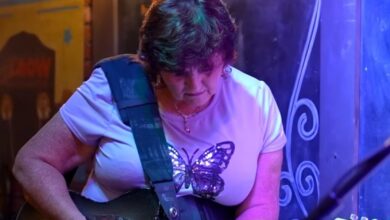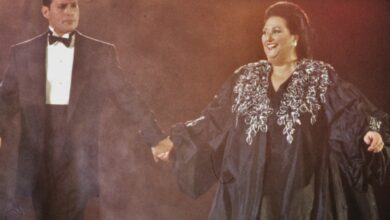Heart’s 1977 “Crazy On You”: A Forever Iconic Blend of Strength and Elegance
Televised rock in the late 1970s brought countless standout moments to fans glued to their living room screens, yet Heart’s fierce performance of “Crazy On You” on The Midnight Special in 1977 remains one of the most exhilarating examples of pure musical authority. Everything about the stage setup felt immediate and unfiltered. Nancy Wilson fired off the performance with bold acoustic rhythms while Ann Wilson’s voice rose like a tidal wave, seizing attention without requiring any special effects or enhancements. The show captured the band fully exposed, performing without technological lifelines. It proved that Heart could deliver a knockout live sound powered entirely by skill, adrenaline, and conviction.
“Crazy On You” originated from Heart’s debut record, Dreamboat Annie, first released in Canada in 1975 before gaining traction in the United States in 1976. From its earliest spins, the song stood out as something daringly fresh. Its structure fused delicate folk-driven verses with sudden eruptions of electric rock intensity, creating a contrast that hadn’t quite existed on mainstream radio before. The single’s arrival helped listeners identify Heart’s signature approach, combining melodic storytelling with fiery instrumental might, making the band instantly recognizable for their ability to shift seamlessly between softness and explosive crescendos.
Ann Wilson’s vocal work in that particular ’77 rendition is a major reason the performance still commands respect. She didn’t simply follow the melodic lines; she shaped them into a roaring declaration of what her voice could accomplish when unleashed onstage. There was measurable control behind every powerful push, a careful grip on tone that kept even the wildest notes perfectly tuned. Performances like this are why she is often mentioned in the same breath as the most revered rock singers in history. Her delivery blends natural gift with refined discipline, resulting in a sound that manages to thrill without ever losing its precision.
Before Ann steps to the mic, Nancy Wilson’s introduction creates anticipation at full force. Her agile fingerpicking technique—sharp, rhythmic, and unmistakably intense—immediately sets the mood. The acoustic guitar becomes more than a gentle foundation; it transforms into a powerhouse instrument acting as timekeeper, riff generator, and percussive engine all in one. The audience instinctively recognizes something riveting is about to unfold. The intro operates like a spark that ignites the entire arrangement, giving the music a heartbeat that pushes forward relentlessly, daring the rest of the band to keep pace.
Nancy has shared in interviews that the energetic prelude often referred to as “Silver Wheels” was influenced by the adventurous acoustic approaches of the era. Her technique draws in elements from progressive fingerstyle guitar, incorporating rapid chord changes and dynamic accents that mimic a bigger ensemble. This transforms one six-string instrument into a small band. When the drums and electric guitars finally slam in, the shift feels like a controlled eruption. It is precisely because of that tightly wound acoustic opening that the song’s transition into electric energy feels so explosive and satisfying.
Lyrically, “Crazy On You” carries tension drawn from both intimate emotion and the worldwide unease of the Vietnam-era climate. Ann Wilson has described how personal affection intertwines with broader anxiety, creating a song that sounds as urgent as it does romantic. There is longing wrapped inside frustration, hope woven into fear. The verses race breathlessly like racing thoughts inside a restless heart, while the chorus offers a release—like taking a deep breath after holding it far too long. This duality anchors the song’s timeless appeal and deepens its emotional punch.
Watching Ann deliver these lyrics live, especially during their 1977 TV appearance, it is clear how much meaning she pours into each moment. She maneuvers through rapid-fire lines while keeping total control over pitch and timing, then expands her voice into majestic belts when the band hits full power. Meanwhile, Nancy’s relentless drive on acoustic creates constant motion beneath Ann’s vocals. The contrast between the acoustic brightness and electric punch injects danger and thrill, making everything feel unpredictable in the best way. This is what turned a great studio track into a cultural live staple.
The song performed well commercially and signaled that Heart’s rise was not a short-lived curiosity. The single reached No. 35 in the United States, climbed to No. 25 in Canada, and soared into the Top 2 overseas in the Netherlands. Those chart figures symbolize just a fraction of the lasting impact it has had. For many listeners, “Crazy On You” became an essential introduction to what rock music could sound like when women took charge at the forefront, not as exceptions, but as definitive leaders in the genre.
For teenagers in that era, television broadcasts like The Midnight Special were moments that delivered the thrill of live concerts straight into their homes. Crowds in living rooms sat as close to the TV as possible, volume creeping up as anticipation built. When Ann’s voice launched into high gear, fans felt like they were witnessing history live. Nancy’s playing opened the door to every kid dreaming of trying the guitar themselves. It wasn’t just entertainment; it created identity for a generation finding their own freedom through music.
The arrangement itself encourages a dramatic physical response from the audience. The pre-chorus tightens all tension until the chorus opens wide like a celebration. Experiencing that transition in a live setting makes listeners instinctively want to stand and shout along. Even a quiet home setting transforms into an imaginary concert venue as soon as the chorus hits. That blend of musical craftsmanship and adrenaline helped turn “Crazy On You” into a permanent presence in rock performance culture.
When Heart revisited the song decades later at their Rock and Roll Hall of Fame induction in 2013, it was clear that none of the fire had diminished. The reunited lineup showed that the singing remained demanding, the guitar playing still required sharp precision, and the arrangement still carried enough intensity to raise the hairs on any listener’s arms. That consistency across time proves that “Crazy On You” was built to last—not as nostalgia artifact, but as music that continues to challenge and inspire musicians and audiences alike.
There is a reason the song has always been regarded as more than just a catchy radio staple. Its story reflects the turbulence of its era while celebrating personal liberation. The Wilson sisters tapped into something deeply relatable and culturally relevant, which is why new generations continue discovering the song and connecting with it as if it were brand-new. Each performance becomes an experience rather than a routine rendition, reminding listeners of the emotional weight great rock music can carry.
Technically speaking, the 1977 performance remains a brilliant example of musicianship operating in full coordination. The band follows Nancy’s intense right-hand engine as if racing behind a lead car, then blasts outward during the choruses with sharp timing and bold dynamic shifts. Ann’s breaths land perfectly between demanding vocal lines, proving her mastery not just of range but of endurance and control. Heart found the exact intersection where precision meets emotional release, creating a version of the song that still feels risky and electrifying decades later.
The legacy of this performance stretches far beyond the broadcast itself. Ann and Nancy Wilson broke open doors for future female artists in rock—singers, shredders, and bandleaders who saw what was possible when confidence and talent collide in public view. They were not presenting themselves as novelties or guest attractions. They were the driving force. Their presence on that stage created a new blueprint: women in rock who didn’t ask for space—they took it, owned it, and defended it note by note.





